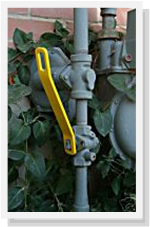|
Emergency Preparedness ~CERT |



|
Do You Know Where Your Gas Shut Off Valve Is Located? |
|
|

|
Living in the Bay Area offers us so many amazingly wonderful things. But, as with most things, for all the good, there are some bad. We need to be prepared for emergencies that will impact our little valley. Knowing where the gas shut off valve for your home is important. Having a $7 gas shut off wrench could make all the difference for your home and for your neighborhood, in the case of an emergency. If emergency vehicles or the gas company cannot reach us, we need to be prepared! The purpose of this guide is to talk about emergency preparedness and how it's a good idea to be prepared to shut off your gas with little or no warning in the event of an emergency. Why Being Prepared MattersThere are real benefits to being prepared. One of the most important is that families who are prepared report less fear, anxiety and losses when disaster hits. Every year, disasters disrupt thousands, even hundreds of thousands, of lives. Each one of these disasters has long-lasting effects to families and to their property. When disaster strikes, government and disaster-relief organizations will most likely be available to help, but you need to be ready as well. Every family should have their own emergency preparedness plan. This includes being prepared for hurricanes, earthquakes, flooding, tornadoes, or extreme weather. It is recommended that families have supplies to be self sufficient for at least three days, which can include providing your own shelter, first aid, food, water, and sanitation. Shutting Off Natural GasEvery home owner or renter that uses natural gas needs to know how to shut off the gas if the home you are living in is severely damaged. Leaking gas can be extremely dangerous if accidentally ignited by a spark. Having a wrench in an emergency kit attached to your gas meter is obviously a plus, and can save your home in an emergency--There are wrenches that are specifically designed to easily turn off the gas. Here are some more tips: First of all, do not shut off the gas unless you smell gas, hear gas escaping, see a broken gas line, you are informed to shut off your gas or if you suspect a gas leak. If you shut off the gas, there may be a considerable delay before a professional can come to your home to turn your service back on. In an emergency, your gas can be turned off at the main gas service shutoff valve normally located near your gas meter. Using an emergency shut-off gas wrench, give the valve a quarter turn in either direction; the valve is closed when the tang (the part you put the wrench on) is crosswise to the pipe. Here are a few steps you can follow in case of a disaster:· Know where your main gas service shutoff valve is located · Keep an emergency shut-off wrench available to turn off the gas in case of an emergency. · Know how to shut off the gas at the gas service shutoff valve. · Leave it off until service can be restored safely by a qualified professional.
Last But Not LeastWhatever the emergency, whatever the situation, you should always have a professional come to your home to turn the gas back on. Once the gas is shut off at the meter, do not try to turn it back on yourself. If the gas service shutoff valve is closed, a qualified professional should perform a safety inspection before the gas service is restored, and the appliance pilots are lit. It is highly recommended to have the gas company, or another qualified individual, relight every pilot light when the gas is turned back on. Forgetting to relight all the pilot lights could result in a dangerous gas buildup in your home and possibly cause another disaster. The Bottom LineIt's simple. The most important thing to you is your family and you want to do everything you can to keep them safe from harm. Taking the time now to be prepared can save you money and possibly even your lives if and when a disaster strikes. |
